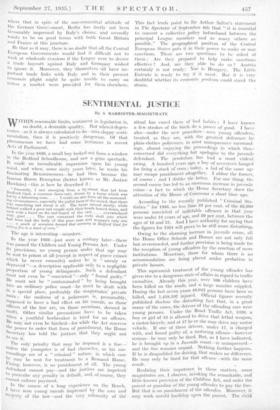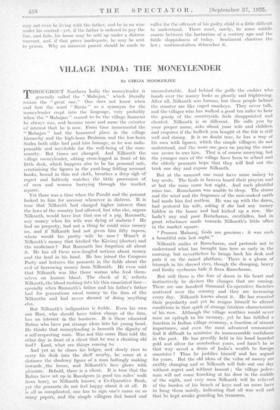SENTIMENTAL JUSTICE
By A BARRISTER-MAGISTRATE WITHIN reasonable limits, sentiment in legislation ,is, no 'doubt, a desirable quality. But when it degen- erateS-Las it is always calculated to do—into sloppy senti- mentalisrn, then it is positively dangerous. Of that Pbeneinenon we have had some instances in recent ActS of Parliament. • In the'year 1880, a small boy looked out from a window and saw a grim spectacle. in the Bedford Schoolhouse, It made 'an ineradicable impression upon his young mind, and when, some sixty years later, he wrote his fascinating Reminiscences—he had then become the faMous Baron Brampton (better known as Mr. Justice Hawkins)---this is how he described it : " Presently, I saw emerging from a by-street that led from Bedford Gaol, a common farm-cart, drawn by a horse which was led by a labouring man.. . . I could see also from all the surround- ing circumstances' especially the pallid faces of the crowd, that there was something sad about it all. The horse moved slowly, while behind walked a poor sad couple with their heads bowed down, and each with a hand on the tail-board of the cart . . . overwhelmed. with grief . . . The cart contained the rude shell into which • had been laid the body of this poor . man and woman's only son • • a youth of seventeen hanged that morning at Bedford Gaol for fretting. fire to a stack of corn."
The age is interesting—seventeen.'
In the year 1938 just over a century later—there Was passed the Children and Young Persons Act. Under its ,j.}i'oviSiOns, no young .person under that age may be sent to priScin at all (except in respect of grave crimes' . which never commits) unless he is " unruly or depriiX,ed "—a description- applicable only to a' negligible' P1•4nrtiori • of young delinqiients. Such a defendant must not even be " convicted " foUnd guilty." Be must not be " contaminated " by being brought into an ordinary police court—he must be dealt with in a special place, preferably the magistrates' private' ; the Uniform of a policeman iS, presumably,' 8apposed.'• to have ' a' bad effect on his morals, so 'those' officers of 'the law are, on those occasions, dressed in' tnufti. ' Other similar precautions have to be taken :when a' :•Yotithful lawbreaker is tried for an offence. He may 'not even be birched—for while the Act reserves'. the power to order that form of punishment, the Horne' Secretary has told the justice's that they ought not to use may that be unposed is a fine—' The only t. Unless the youngster is of bad character, or hiS sur- roundings are of a " criminal " nature, in which case' Ire 'may be sent for treatment to a Remand Home. Pining, however, is no 'punishment at all. The young defendant cannot pay—and the justices arc impotent' to Prescribe any penalty in default, and, of course; they cannot enforce payment. In the course of .a long experience on the Bench, I have Seen young rascals iinPresSecl by the awe and majesty of the law—and the very solemnity of the ritual has cured theof bad habits ; I have known m a few strokes of the birch do a. power of good. I have also—under the new procedure—seen young offenders, treated, as they are, with the greatest deference by, plain-clothes policemen, in most unimpressive surround- ings, almost enjoying the proceedings in which thoso, concerned did everything but apologise to the juvenile defendant. The pendulum has had a most violent. swing. A hundred years ago, a boy of seventeen hanged for firing a stack ,of corn ; today, a lad of the same age may escape pUnislunent altogether, I abhor the former, of course ; and I dislike the latter. For. one thing, the second course has led to an enormous increase in juvenile crime—a fact to, which the Home Secretary drew the attention of the House of Commons a short time ago.
According to the recently published " Criminal Sta- tistics " for 1933, no less than 28 per cent. of the 62,660 persons convicted of indicatabdle20opffeer cnee:ntinbeten that year were. under 16 years of age, n ages of 16 and 21. And I have authority for saying that the figures for 1934 will prove to be still more disturbing. Owing to the alarming increase in juvenile crime, ally the Home Office Schools and' Homes are not only full but overcrowded, and further provision is being made for the reception of young offenders by the erection of more institutions. Meantime, those for whom there is no accommodation are being placed under probation in private houses. This squeamish treatment of the young offender has given rise to a dangerous state of affairs in regard to traffic onumber shalrecrippled.11.o s casualties. Already this year, over 500 children have been killed on the roads, and a NI:Ls n that, r eis in During the last seven years 48,042 killed, and 1,418,192 injured. Official ct t h figures published disclose the disturbinga many of the cases,-the 'drivers of the Offending cars were - young persons. Under the Road Traffic Act, 1980, .a boy or girl of 16 is allowed to drive that lethal weapon, ' a motor-bicycle, and at 17 he or she may drive any motor' vehicle. If one of these drivers, under 17; is charged with, and found guilty of, a motoring offence—however serious—he may only 'be fined. But, as I have indicated, he is brought up in a Juvenile court__ is unimpressed— • and the flrie remains unpaid. Nothing further happens. If he is disqualified for driYing, that makes no difference. He . may only be fined for that offence—With the same result.
Realising their impotence, in these matters, some magistrates are, I observe, invoking the remarkable, and little-known proVision of the Children Act, and order the parent or guardian of the young offender to pay the fine. Btit that is no punishment Of the offender. Moreover, it may work untold hardship upon the parent. The child . may not even be living with the father, and be in no wise under his control—yet, if the father is ordered to pay the fine, and fails, his home may be sold up under a distress warrant, and, if that prove inadequate, be may be sent to. prison. Why an innocent parent should be made to suffer for the offences of his guilty child is a little difficult to understand. There must, surely, be sonic middle course between the barbarism of a century ago and the futile sloppishness of today. Sentiment chastens the law ; sentimentalism debauches it.















































 Previous page
Previous page